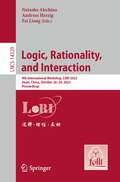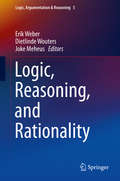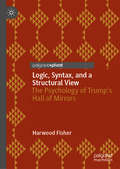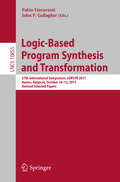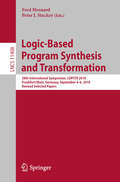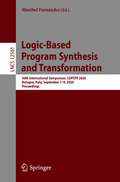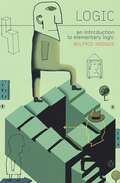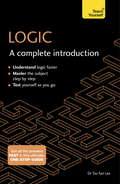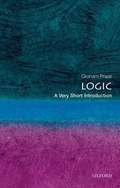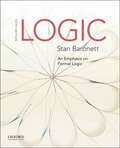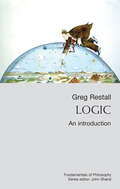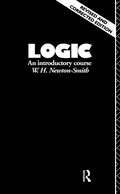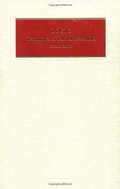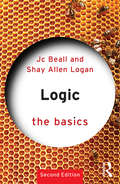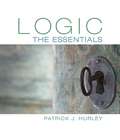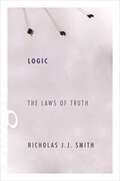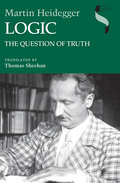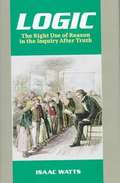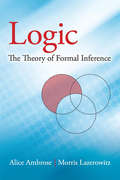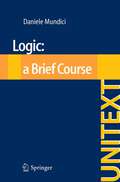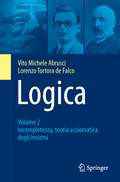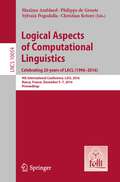- Table View
- List View
Logic, Rationality, and Interaction: 9th International Workshop, LORI 2023, Jinan, China, October 26–29, 2023, Proceedings (Lecture Notes in Computer Science #14329)
by Andreas Herzig Natasha Alechina Fei LiangThis LNCS book is part of the FOLLI book series and constitutes the proceedings of the 9th International Workshop on Logic, Rationality, and Interaction, LORI 2023, held in Jinan, China, in October 2023.The 15 full papers presented together with 7 short papers in this book were carefully reviewed and selected from 40 submissions. The workshop covers a wide range on the following topics such as agency; argumentation and agreement; belief representation; probability and uncertainty; belief revision and belief merging; knowledge and action; dynamics of informational attitudes; intentions, plans, and goals; decision making and planning; preference and utility; cooperation; strategic reasoning and game theory; epistemology; social choice; social interaction; speech acts; knowledge representation; norms and normative systems; natural language; rationality; philosophical logic.
Logic, Reasoning, and Rationality
by Erik Weber Dietlinde Wouters Joke MeheusThis book contains a selection of the papers presented at the Logic, Reasoning and Rationality 2010 conference (LRR10) in Ghent. The conference aimed at stimulating the use of formal frameworks to explicate concrete cases of human reasoning, and conversely, to challenge scholars in formal studies by presenting them with interesting new cases of actual reasoning. According to the members of the Wiener Kreis, there was a strong connection between logic, reasoning, and rationality and that human reasoning is rational in so far as it is based on (classical) logic. Later, this belief came under attack and logic was deemed inadequate to explicate actual cases of human reasoning. Today, there is a growing interest in reconnecting logic, reasoning and rationality. A central motor for this change was the development of non-classical logics and non-classical formal frameworks. The book contains contributions in various non-classical formal frameworks, case studies that enhance our apprehension of concrete reasoning patterns, and studies of the philosophical implications for our understanding of the notions of rationality.
Logic, Syntax, and a Structural View: The Psychology of Trump's Hall of Mirrors
by Harwood FisherThis book presents a new structural approach to the psychology of the person, inspired by Kenneth Colby’s computer-generated simulation, PARRY. The simulation was of a paranoid psychological state, represented in forms of the person's logic and syntax, as these would be evidenced in personal communication. Harwood Fisher uses a Structural View to highlight similarities in the logical form of the linguistic representations of Donald Trump, his avid followers (“Trumpers”), and the paranoid—referred to as “The Trio.” He demonstrates how the Structural View forms a series of logical and schematic patterns, similar to the way that content analysis can bring forth associations meanings, and concepts held in the text. Such comparisons, Fisher argues, can be used to shed light on contingencies for presenting, representing, and judging truth. Specifically, Fisher posits that the major syntactic and logical patterns that were used to produce the computer-generated “paranoid” responses in Colby’s project can be used to analyze Donald Trump’s rhetoric and his followers’ reactions to it. Ultimately, Fisher offers a new kind of structural approach for the philosophy of psychology. This novel work will appeal to students and scholars of social and cognitive psychology, psychology of personality, psychiatric classification, psycholinguistics, rhetoric, and computer science.
Logic-Based Program Synthesis and Transformation: 27th International Symposium, LOPSTR 2017, Namur, Belgium, October 10-12, 2017, Revised Selected Papers (Lecture Notes in Computer Science #10855)
by John P. Gallagher Fabio FioravantiThis book constitutes the thoroughly refereed post-conference proceedings of the 27th International Symposium on Logic-Based Program Synthesis and Transformation, LOPSTR 2017, held in Namur, Belgium, in October 2017. The 19 revised full papers were carefully reviewed and selected from 29 submissions. In addition to the 19 revised papers, this volume includes the abstracts of the invited talks by three outstanding speakers: Sumit Gulwani, Marieke Huisman, and Grigore Roşu. The aim of the LOPSTR series is to stimulate and promote international research and collaboration on logic-based program development. LOPSTR is open to contributions in all aspects of logic-based program development, all stages of the software life cycle, and issues of both programming-in-the-small and programming-in-the-large. LOPSTR traditionally solicits contributions, in any language paradigm, in the areas of synthesis, specification, transformation, analysis and verification, specialization, testing and certification, composition, program/model manipulation, optimization, transformational techniques in SE, inversion, applications, and tools.
Logic-Based Program Synthesis and Transformation: 28th International Symposium, LOPSTR 2018, Frankfurt/Main, Germany, September 4-6, 2018, Revised Selected Papers (Lecture Notes in Computer Science #11408)
by Fred Mesnard Peter J. StuckeyThis book constitutes the thoroughly refereed post-conference proceedings of the 28th International Symposium on Logic-Based Program Synthesis and Transformation, LOPSTR 2018, held in Frankfurt/Main, Germany, in September 2018.The 11 revised full papers were carefully reviewed and selected from 29 submissions. In addition to the 11 papers, this volume includes 3 abstracts of invited talks and 2 abstracts of invited tutorials. The papers are grouped into the following topics: analysis of term rewriting; logic-based distributed/concurrent programming; analysis of logic programming; and program analysis.
Logic-Based Program Synthesis and Transformation: 30th International Symposium, LOPSTR 2020, Bologna, Italy, September 7–9, 2020, Proceedings (Lecture Notes in Computer Science #12561)
by Maribel FernándezThis book constitutes the refereed proceedings of the 30th International Conference on Logic-Based Program Synthesis and Transformation, LOPSTR 2020, which was held during September 7-9, 2020. The 15 papers presented in this volume were carefully reviewed and selected from a total of 31 submissions. The book also contains two invited talks in full paper length. The contributions were organized in topical sections named: rewriting; unification; types; verification; model checking and probabilistic programming; program analysis and testing; and logics.
Logic: 15th International Workshop, Wollic 2008 Edinburgh, Uk, July 1-4, 2008, Proceedings (Lecture Notes In Computer Science Ser. #5110)
by Wilfrid HodgesIf a man supports Arsenal one day and Spurs the next then he is fickle but not necessarily illogical. From this starting point, and assuming no previous knowledge of logic, Wilfrid Hodges takes the reader through the whole gamut of logical expressions in a simple and lively way. Readers who are more mathematically adventurous will find optional sections introducing rather more challenging material. 'A lively and stimulating book' Philosophy
Logic: A Complete Introduction: Teach Yourself
by Siu-Fan LeeUnderstand Logic is a comprehensive introduction to this fascinating though sometimes challenging subject. As well as looking at logic in theoretical terms the book considers its everyday uses and demonstrates how it has genuine practical applications. It will take you step by step through the most difficult concepts and is packed with exercises to help you consolidate your learning at every stage. Covering everything from syllogistic logic to logical paradoxes and even looking at logic in Alice in Wonderland, this is the only guide you will ever need.
Logic: A Very Short Introduction
by Graham PriestThis book is an introduction to logic, as contemporary logicians now understand the subject. It does not attempt to be a textbook, however. The point of this one is to explore the roots of logic, which sink deep into philosophy. Some formal logic will be explained along the way. In each of the main chapters, I start by taking up some particular philosophical problem or logical puzzle. I then explain one approach to it.
Logic: An Emphasis on Formal Logic
by Stan BaronettFeaturing an exceptionally clear writing style and a wealth of real-world examples and exercises, Logic: An Emphasis on Formal Logic, Fifth Edition, shows how logic relates to everyday life, demonstrating its applications in such areas as the workplace, media and entertainment, politics, science and technology, student life, and elsewhere. The examples and exercises were chosen to be interesting, thought-provoking, and relevant to students.
Logic: An Introduction (Fundamentals of Philosophy)
by Greg RestallThe methods of logic are essential to an understanding of philosophy and are crucial in the study of mathematics, computing, linguistics and many other subjects. Introducing the major concepts and techniques involved in the study of logic, this authoritative book explores both formal and philosophical logic, and the ways in which we can achieve good reasoning. Individual chapters include: * Propositions and Arguments* Truth Tables* Trees* Conditionality* Natural Deduction* Predicates, Names and Quantifiers* Definite Descriptions. This exceptionally clear introduction to the subject is ideally suited to students taking introductory courses in logic.
Logic: An Introductory Course
by W.H. Newton-SmithFirst published in 1985. Routledge is an imprint of Taylor & Francis, an informa company.
Logic: Bullet Guides
by Joe MorrisonOpen this book and you will: - Learn what logic is - Use truth tables and truth trees - Make sense of complex arguments - Use logic every day
Logic: Bullet Guides
by Joe MorrisonOpen this book and you will Learn what logic is Use truth tables and truth trees Make sense of complex arguments Use logic every day
Logic: Teach Yourself
by Siu-Fan LeeUnderstand Logic is a comprehensive introduction to this fascinating though sometimes challenging subject. As well as looking at logic in theoretical terms the book considers its everyday uses and demonstrates how it has genuine practical applications. It will take you step by step through the most difficult concepts and is packed with exercises to help you consolidate your learning at every stage. Covering everything from syllogistic logic to logical paradoxes and even looking at logic in Alice in Wonderland, this is the only guide you will ever need.
Logic: Techniques Of Formal Reasoning
by Donald Kalish Gary Mar Richard MontagueLogic: Techniques of Formal Reasoning, 2/e is an introductory volume that teaches students to recognize and construct correct deductions. It takes students through all logical steps--from premise to conclusion--and presents appropriate symbols and terms, while giving examples to clarify principles. Logic, 2/e uses models to establish the invalidity of arguments, and includes exercise sets throughout, ranging from easy to challenging. Solutions are provided to selected exercises, and historical remarks discuss major contributions to the theories covered.
Logic: The Basics
by Jc Beall Shay A. LoganLogic: The Basics is an accessible introduction to several core areas of logic. The first part of the book features a self-contained introduction to the standard topics in classical logic, such as: · mathematical preliminaries · propositional logic · quantified logic (first monadic, then polyadic) · English and standard ‘symbolic translations’ · tableau procedures. Alongside comprehensive coverage of the standard topics, this thoroughly revised second edition also introduces several philosophically important nonclassical logics, free logics, and modal logics, and gives the reader an idea of how they can take their knowledge further. With its wealth of exercises (solutions available in the encyclopedic online supplement), Logic: The Basics is a useful textbook for courses ranging from the introductory level to the early graduate level, and also as a reference for students and researchers in philosophical logic.
Logic: The Essentials
by Patrick J. HurleyLOGIC: THE ESSENTIALS concentrates on the fundaments of introductory logic. Practical in orientation and content, Essentials is loaded with class-tested, proven practice exercises. This new text is based on the classic and bestselling textbook, A Concise Introduction to Logic, and nearly all of the exercises in the correlative chapters, so central to the effectiveness of that text, have been retained to ensure more than enough practice for students to master the central concepts. The book focuses largely on deductive logic, but it contains sufficient treatment of induction to provide a solid footing for informal fallacies. The result is a contemporary approach--more focused, more practical, less theoretical--built on a tradition of precise, elegant, and clear presentation of the subject matter of logic, both formal and informal.
Logic: The Laws of Truth
by Nicholas J.J. SmithLogic is essential to correct reasoning and also has important theoretical applications in philosophy, computer science, linguistics, and mathematics. This book provides an exceptionally clear introduction to classical logic, with a unique approach that emphasizes both the hows and whys of logic. Here Nicholas Smith thoroughly covers the formal tools and techniques of logic while also imparting a deeper understanding of their underlying rationales and broader philosophical significance. In addition, this is the only introduction to logic available today that presents all the major forms of proof--trees, natural deduction in all its major variants, axiomatic proofs, and sequent calculus. The book also features numerous exercises, with solutions available on an accompanying website.Logic is the ideal textbook for undergraduates and graduate students seeking a comprehensive and accessible introduction to the subject.Provides an essential introduction to classical logicEmphasizes the how and why of logicCovers both formal and philosophical issuesPresents all the major forms of proof--from trees to sequent calculusFeatures numerous exercises, with solutions available at http://njjsmith.com/philosophy/lawsoftruth/The ideal textbook for undergraduates and graduate students
Logic: The Question of Truth (Studies in Continental Thought)
by Martin HeideggerHeidegger&’s radical thinking on the meaning of truth in a &“clear and comprehensive critical edition&” (Philosophy in Review). Martin Heidegger&’s 1925–26 lectures on truth and time provided much of the basis for his momentous work, Being and Time. Not published until 1976—three months before Heidegger&’s death—as volume 21 of his Complete Works, it is nonetheless central to Heidegger&’s overall project of reinterpreting Western thought in terms of time and truth. The text shows the degree to which Aristotle underlies Heidegger&’s hermeneutical theory of meaning. It also contains Heidegger&’s first published critique of Husserl and takes major steps toward establishing the temporal bases of logic and truth. Thomas Sheehan&’s elegant and insightful translation offers English-speaking readers access to this fundamental text for the first time.
Logic: The Right Use of Reason in the Inquiry After Truth
by Isaac WattsAs a child of Puritan parents, it is not surprising that Isaac Watts was greatly concerned about people s ability to think clearly. Whether a man was studying for the ministry or any other of the sciences, the ability to reason rightly was of utmost importance. Watts s work on logic and reason became a standard textbook for nearly 200 years, being used in such schools as Oxford, Cambridge, Harvard, and Yale. In Logic, Watts address proper thinking under the four basic functions of the human mind: perception, judgment, reasoning, and disposition. In part one, Watts addresses human perception, the cultivation of ideas, and how we associate them with words. In part two, Watts treats human judgment and its ability to construct various kinds of propositions, while giving guidance for avoiding the formation of bad judgments. Part three covers our ability to reason, giving instruction on the use of syllogisms for constructing a good argument. Part four discusses the mind s disposition as a method of arranging our thoughts for better understanding and memory. This book will help discipline the mind and train the reader to discern proper thinking and argumentation in seeking truth.
Logic: The Theory of Formal Inference
by Morris Lazerowitz Alice AmbroseGeared toward college undergraduates new to the subject, this concise introduction to formal logic was written by Alice Ambrose and Morris Lazerowitz, a pair of noted scholars and prolific authors in this field. A preliminary section opens the subject under the heading of truth-functions. Two subsequent parts on quantification and classes, each subdivided into numerous brief specifics, complete the overview. Suitable for students of philosophy as well as mathematics, the three-part treatment begins with the intuitive development of the standard theory of sentential connectives (called "operators"). The theory is further developed with the assistance of truth-tables and ultimately as a logistic system. Part II explores first-order quantification theory. In addition to examining most of the familiar laws that can be expressed by monadic formulas, the text addresses polyadic principles and the theories of identity and descriptions. Part III focuses on elementary concepts of classes, from class membership and class inclusion to the algebra of classes. Each part concludes with a series of exercises.
Logic: a Brief Course
by Daniele MundiciThis short book, geared towards undergraduate students of computer science and mathematics, is specifically designed for a first course in mathematical logic. A proof of Gödel's completeness theorem and its main consequences is given using Robinson's completeness theorem and Gödel's compactness theorem for propositional logic. The reader will familiarize himself with many basic ideas and artifacts of mathematical logic: a non-ambiguous syntax, logical equivalence and consequence relation, the Davis-Putnam procedure, Tarski semantics, Herbrand models, the axioms of identity, Skolem normal forms, nonstandard models and, interestingly enough, proofs and refutations viewed as graphic objects. The mathematical prerequisites are minimal: the book is accessible to anybody having some familiarity with proofs by induction. Many exercises on the relationship between natural language and formal proofs make the book also interesting to a wide range of students of philosophy and linguistics.
Logica: Volume 2 - Incompletezza, teoria assiomatica degli insiemi (UNITEXT #111)
by Vito Michele Abrusci Lorenzo Tortora de FalcoL'opera si propone come testo di riferimento per acquisire una solida preparazione specialistica nella Logica, presentando in maniera rigorosa ed innovativa argomenti tradizionalmente affrontati nei corsi universitari di secondo livello. Questo secondo volume, che completa l'opera, presenta le basi della teoria della ricorsività, l'aritmetica di Peano ed i teoremi di incompletezza, gli assiomi della teoria assiomatica degli insiemi di Zermelo-Fraenkel e la teoria degli ordinali e dei cardinali che ne deriva.
Logical Aspects of Computational Linguistics. Celebrating 20 Years of LACL: 9th International Conference, LACL 2016, Nancy, France, December 5-7, 2016, Proceedings (Lecture Notes in Computer Science #10054)
by Sylvain Pogodalla Maxime Amblard Christian Retoré Philippe De GrooteEdited under the auspices of the Association of Logic, Language andInformation (FoLLI), this book constitutes the refereed proceedings ofthe 20th anniversary of the International Conference on LogicalAspects of Computational Linguistics, LACL 2016, held in LORIA Nancy,France, in December 2016. The 19 contributed papers, presentedtogether with 4 invited papers and 6 abstracts, were carefullyreviewed and selected from 38 submissions. The focus of the conferenceis the use of type theoretic, proof theoretic, and model theoreticmethods for describing and formalising natural language syntax,semantics, and pragmatics as well as the implementation of thecorresponding tools.
